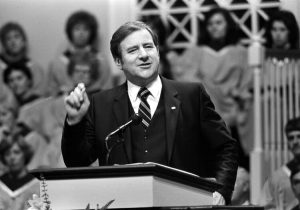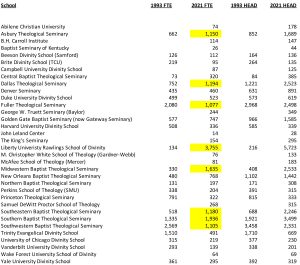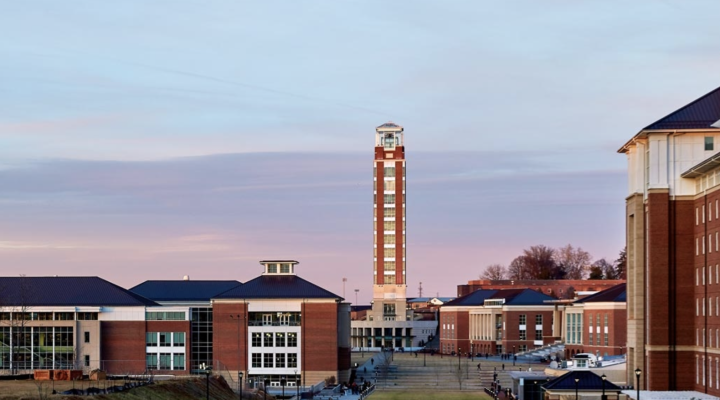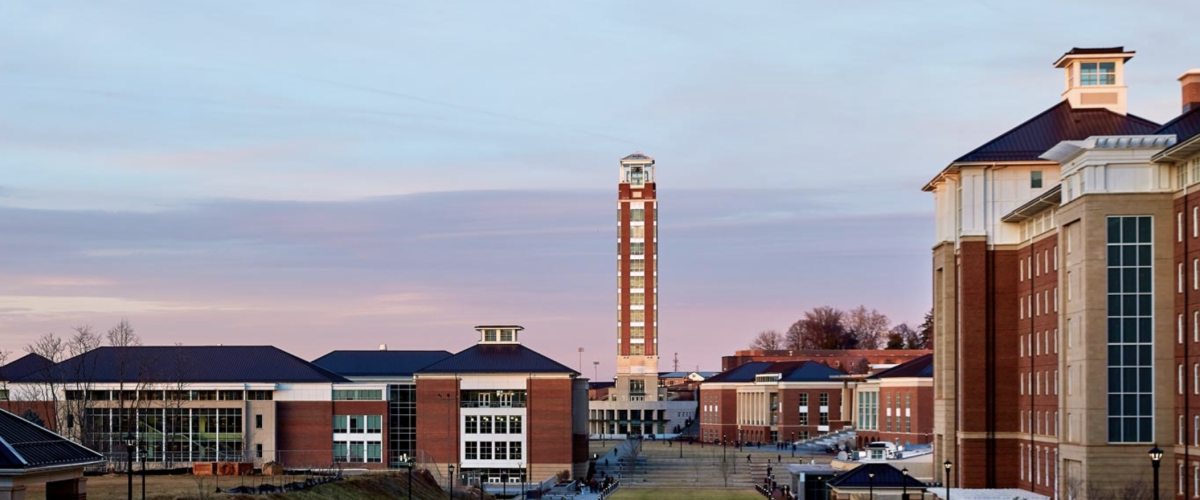If Southwestern Baptist Theological Seminary isn’t the world’s largest seminary anymore, what is?
While it’s not easy to assess the world’s largest seminary, it is easy to identify the nation’s largest seminary. The answer may surprise some but also illustrates one of the greatest changes in theological education over the past 30 years: Liberty University’s John J. Rawlings School of Theology.
Yes, that Liberty University. The one founded by Jerry Falwell as an independent Baptist school when he considered the Southern Baptist Convention too liberal to be trusted.

Jerry Falwell
Falwell launched Liberty University in 1971 and today, due largely to its vast online presence, it ranks as the largest university in the nation by enrollment. The complete school reports 94,000 students taking classes online and 15,000 students on campus in Lynchburg, Va. Those numbers are headcount enrollment, not Full Time Equivalent enrollment, which is the most common comparative standard.
Lynchburg Theological Seminary, now known as Rawlings School of Theology at Liberty University, began in 1973. Among several things that sets Rawlings apart from traditional seminaries is the small number of full-time faculty. In the latest report through the Association of Theological Schools, Rawlings reports a headcount of 5,723 students (with an FTE enrollment of 3,755) taught by just 16 full-time faculty. The school notes a faculty FTE of 86, however, meaning the vast majority of professors are part time or adjunct.
Both Liberty University and its seminary identify as Baptist schools.

While most seminaries in America have struggled to maintain enrollment, Rawlings has grown exponentially, from a 1993 FTE of 134 to today’s 3,755. No other seminary comes close to that level of growth over the last three decades. (About half the FTE at Rawlings comes from the master of divinity program, the bellwether of theological education.)
In the past, the SBC seminaries often stood alone as the largest seminaries in America. Even today, of 226 members institutions of ATS in the United States, only eight reported an FTE enrollment of 1,000 or more in 2021. Of those eight, four are SBC schools. Only 3% of ATS member schools report FTE enrollments of 1,000 or more. The vast majority of seminaries in the United States report FTE enrollment of 150 or less.
BNG previously reported on the dramatic decline in enrollment at Southwestern Seminary, one of the six SBC schools, over the past 30 years. Southwestern, based in Fort Worth, Texas, has experienced an 82% drop in enrollment in its M.Div. degree program.
Southwestern stands alone among the six SBC seminaries in its shrinkage. Every other SBC seminary has grown in enrollment over the past 30 years — some significantly.
Again, using publicly available data reported to ATS, a BNG analysis found that from 1993 to 2021, Southern Baptist Theological Seminary recorded an FTE growth from 1,335 to 1,936; Southeastern Baptist Theological Seminary from 518 to 1,180; Midwestern Baptist Theological Seminary from 330 to 1,635; New Orleans Baptist Theological Seminary from 480 to 768; and Gateway Seminary (formerly Golden Gate Baptist Theological Seminary) from 577 to 747.
Ironically, the second and third greatest growth in FTE enrollment over the past 30 years has occurred at two very different seminaries in the same metropolitan area: Midwestern Baptist Theological Seminary and Central Baptist Theological Seminary. Midwestern is an SBC school that has grown 395%; Central is an American Baptist Churches USA seminary also affiliated with the Cooperative Baptist Fellowship that has grown 338%. Both are located in metropolitan Kansas City.
Another breakout star in enrollment growth over the past 30 years is Dallas Theological Seminary.
Another breakout star in enrollment growth over the past 30 years is Dallas Theological Seminary, a nondenominational school known for teaching premillennial dispensationalism. Located just 30 miles away from Southwestern Seminary, DTS increasingly has been seen as a competitor to Southwestern. FTE enrollment at DTS has grown from 752 to 1,194.
BNG’s selected analysis of 34 seminaries that are most likely to educate Baptist pastors included 11 seminaries or divinity schools that didn’t exist or were not accredited by ATS in 1993: Abilene Christian University, B.H. Carroll Institute, Campbell University Divinity School, George W. Truett Seminary at Baylor University, John Leland Center, McAfee School of Theology at Mercer University, M. Christopher White School of Divinity at Gardner-Webb University, The Master’s Seminary, Samuel DeWitt Proctor School of Theology, Wake Forest University School of Divinity.
While the last three decades have seen increasing challenges in theological education, they also have witnessed innovation and new launches. At least five of the new schools listed above were created to some degree in reaction to the rightward shift of the SBC in the 1980s and 1990s.
The SBC seminaries always have been and still remain outliers in the context of American theological education because of their size and the financial resources provided by the denomination that significantly subsidizes tuition. The SBC is the largest non-Catholic denomination in America.
Rounding out the top eight largest seminaries in America are Asbury Seminary, a Wesleyan school in Central Kentucky that has grown from an FTE enrollment of 662 in 1993 to 1,150 in 2021; and Fuller Theological Seminary in Pasadena, Calif., a nondenominational school that has shrunk in half over the past 30 years, from an FTE of 2,080 to 1,077.
Also notable for its decline is Trinity Evangelical Divinity School, a once highly influential nondenominational school that has declined from an FTE of 1,510 to 491 and recently announced major readjustments in faculty and funding.
Among the Ivy League divinity schools, all have experienced decline but not on the scale of Southwestern or Trinity. Harvard, Princeton and Yale all hover around 300 in FTE enrollments. Princeton has taken the hardest hit of the bunch, dropping from 791 to 322 in 30 years. (Princeton Seminary is independent from Princeton University but generally carries the prestige of its Ivy League name while not technically an Ivy League school.)
Likely due to endowments, the Ivies report some of the largest numbers for full-time faculty of any seminaries in America. Princeton Seminary, for example, reports 41 full-time faculty and a faculty FTE of 56. Only nine other seminaries in America employ more full-time faculty than Princeton.
Related articles:
What happened at Southwestern and why does it matter? | Analysis by Mark Wingfield


